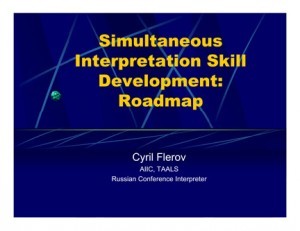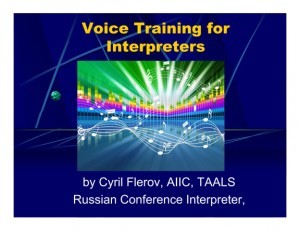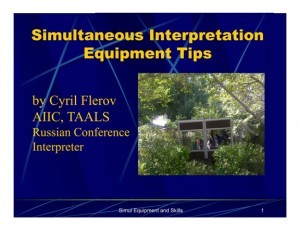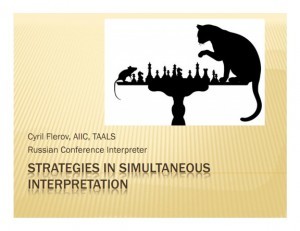InterStar Translations offers continuing education language neutral seminars for simultaneous and consecutive interpreters by Cyril Flerov, Russian Conference interpreter, AIIC, TAALS. A seminar may be a half day, full day or multiple day event. The seminars are available worldwide. For information contact seminars@interstartranslations.com

Cyril Flerov is a professionally trained San Francisco, USA based Russian conference interpreter (Russian A, English B) educated both in Russia and in the Unites States. He has over 20 years of experience in simultaneous and consecutive interpretation and worked freelance at events organized by major US, Russian,
UK and international clients. A member of the International Association of Conference Interpreters (AIIC) and of The American Association of Language Specialists (TAALS), he has experience teaching simultaneous and consecutive interpretation both in Russia and in the United States, including MIIS – Middlebury Institute of International Studies (formerly the Monterey Institute of International Studies) in Monterey, California.
All events are conducted by Cyril Flerov in English or Russian as needed. All lectures are language neutral and the information may be used by interpreters with different language combinations, especially when interpreting from English.
The lectures are based on the presentation Advanced Simultaneous Interpretation Skills delivered at the Annual Meeting of the California Federation of Interpreters (CFI), San Francisco, CA in 2011 and educational lectures about the interpretation profession for general audiences, e.g. NASA, and one-on-one consultations provided to practicing interpreters over the past 15 years.
The seminars and lectures were successfully conducted for a variety of interpreter associations and other organizations such as California Federation of Interpreters, Chicago Area Translators and Interpreters Association (CHICATA), Society of Translators and Interpreters of British Columbia (STIBC, Vancouver, BC, Canada), Northern California Translators Association, the Middlebury Institute of International Studies, and others.
“Roadmap for Simultaneous Interpretation Skill Development” 3 hours
Intuitive understanding how simultaneous interpretation works (especially if the interpreter has no formal training) may not be sufficient to continue upgrading your interpretation skills. There is a certain degree of self-analysis that is required as well as understanding of basic linguistic concepts behind the skill.
The lecture introduces various basic and advanced processes during simultaneous interpretation both for beginners and for practicing interpreters and shows how the principles can be used to interpret with more awareness of the inner mechanisms of interpretation. Finer points of the skill, including SI flow diagram, input text analysis, segmentation, probability prediction/anticipation, mental readiness and many others are described in detail. The lecture also touches upon creative aspects of interpretation, such as degree of closeness to the original, accommodating various audiences, interpreter credibility.

“This training was fantastic. I learned a whole lot of information and it was great to have close contact with an experienced professional!” JMF
The speaker will show examples of various exercises to start mastering the skill or advance the existing skills.
Original PowerPoint presentation consisting of 137 slides developed by the author is used to illustrate finer points of the skill, including SI schematic, input text analysis, segmentation, probability prediction, mental readiness and many others. The lectures are geared towards student interpreters and practicing interpreters willing to integrate their skills.
“Voice Training for Conference Interpreters” 4 hours
CIMCE credits: L3780, 4 hours
The lecture is designed both for interpreter students and practicing interpreters. One 4 hour lecture covers basics of voice work as needed by conference interpreters. The lecture is richly illustrated with audio examples and is accompanied by 103 slides. Various techniques to illustrate developing professional voice qualities are presented, as well as computer software and other assets.
In the presentation, the following elements will be covered: common issues interpreters have with voice and ways to resolve them, using computer software to work on voice (practical session with demonstrations and exercises), and voice care.
There is a certain degree of misunderstanding, even among some interpreters, about teaching voice skills. Some think that it is better left to voice trainers and not interpretation trainers, however, we should be more aware of the fact that traditional voice training does not cover some of the voice skills interpreters need. Correcting student voice should become a routine part of interpreter training from the very beginning.

“I really enjoyed the seminar and was surprised at the abundance of information that was included in such a single-day event. Thank you very much Cyril for sharing your insights about this profession!” TH
We will cover basic vocal work and exercises for professional language interpreters and students of interpretation. Interpreter voice is evaluated by users of interpretation subconsciously and is an important factor in creating interpreter credibility. We will talk about specific voice characteristics e.g. pitch, volume, rhythm etc. in generic terms and specifically as the characteristic is used in simultaneous or consecutive interpretation.
Some exercises we will see involve use of free computer software and work with prerecorded audio files. Voice care and preventing voice issues are briefly covered. The information may be used by students and by the interpreters already practicing on the market as a tool for self-evaluation.
Because it would be unethical to criticize a boothmate’s performance, no feedback from colleagues is usually offered, so many issues – including voice problems – remain uncorrected. It is particularly true for self-taught or volunteer interpreters.
“Simultaneous Interpretation Equipment” 1 hour
This 1 hour lecture illustrates basic types of simultaneous interpretation equipment and advanced skills needed to use it in the professional booth or during chuchotage including ISO equipment standards. (109 slides)

“Excellent content and presenter” Francisco Resendiz
“Use of computer software in interpreter training” 30 minutes
Lecture and demonstration on how to streamline simul and consec classes by using computer software more efficiently.
“Strategies in Simultaneous Interpretation” 80 minutes
The 80 minute lecture covers basic text processing strategies in SI, such as segmentation, digesting etc. Successful SI of a combination of various strategies with each used as appropriate depending on the characteristics of the text and the speaker.

“The course was very well planned…Great sessions.” Susana Fredin
Strategies are discussed in sequence with examples and various recommendations are given on how to use the strategies in concert.
“Working on the Market: Tips and Tricks” 2 hours
In the presentation, the following topics will be covered: the psychology of freelancing, contract negotiation, assignment preparation, work etiquette, and career “midlife crisis” management. Freelancers in different professions face a number of unique challenges. The relative social isolation and lack of group support may be difficult to manage.
We will discuss the nature of the problem and possible solutions for freelance interpreters and translators. Once embarking on the career, freelancers’ interpretation and translation skills are only one facet of their “professional persona.” The way professionals interact with others critically defines their value and career opportunities, and we will discuss ways to maintain our professional integrity while recognizing perspectives of other market players.
When drafting contracts, there are basic things that interpreters and translators need to know. Sharing rich experience as an AIIC and TAALS member, the speaker will discuss vital elements such as assignment preparation and work etiquette for the delivery of outstanding language services. Finally yet importantly, the career path of a freelancer is different from a traditional one where a corporate ladder is available. We will discuss what it means to “advance in one’s career” in our line of business and ways to manage career midlife crisis
Overview of Background Knowledge, Skills and Resources Conference Interpreters Need (30 minutes)
The lecture briefly describes types of knowledge, skills and resources for conference interpreters. Various topics are discussed e.g. sci/tech, diplomacy, and strategies are given for assignment preparation and handling technical topics.
The courses and lectures have been tested and received good feedback both from students and practicing interpreters.

